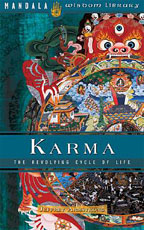Jeffrey Armstrong has been a student and scholar of the Vedic Philosophy for more than 35 years. He holds degrees in psychology, literature, and comparative religion and is based in Vancouver, Canada. In this brief and beautifully designed book, Armstrong presents a rounded and multidimensional look at the laws of karma. He states:
"Karma raises the questions of who we are in the final state of our being, where we come from, why we are here, who or what is in control of the universe and what possibilities are there beyond our present experiences."
The author maintains that the Vedic library of knowledge gave rise to the study of karma as a science. Reincarnation comes into play as our lives reflect the cause and effect of the choices and actions of our previous lifetimes. Armstrong covers the following subjects in this succinct little book: the difference between humans and animals, old souls and young souls, the cosmic investment program, the idea that we are farmers planting the seeds of karma, the role of devas as angels or cosmic postal carriers, the ways in which thoughts put the wheels in motion, creating our future from present actions, taking a vow, and the law of association. In a question and answer session near the end of the book, Armstrong observes:
"According to the Vedas, the purpose of life on Earth is the evolution of souls in the direction of liberation. In this view, there is no particular end goal of history or final plan for being on Earth. It is just like attending a school. The purpose of the school is the education and evolution of the individual students. Other than that, the school has no separate purpose. For this reason, the karmic view is that we should maintain the Earth in perfect condition for future generations of students."
